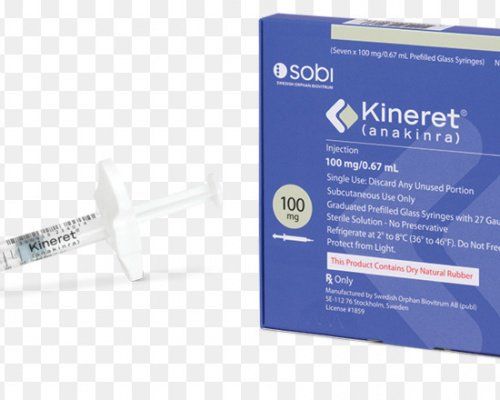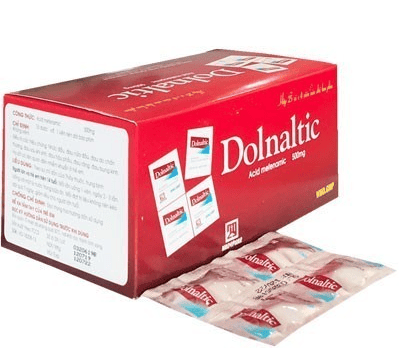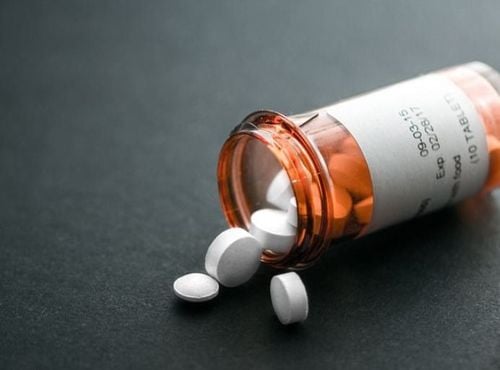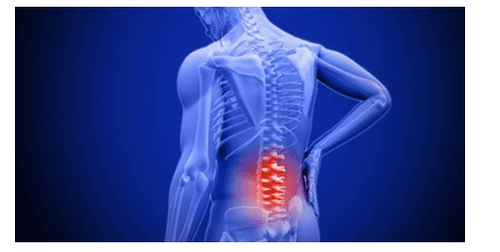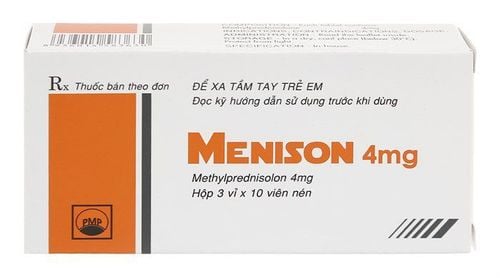This is an automatically translated article.
Tiantone contains the active ingredient Nabumetone, a non-steroidal anti-inflammatory pain reliever, commonly indicated for the treatment of acute or chronic inflammatory symptoms in osteoarthritis.
1. What is Tiantone drug?
Tiantone is an NSAID (non-steroidal anti-inflammatory drug), which inhibits mainly prostaglandin synthesis. Tiantone is available in tablet form and is taken orally. With ingredients Nabumetone, Tiantone has the main effect of pain relief, anti-inflammatory.
When taking Tiantone, Nabumetone will be mainly absorbed through the small intestine, then rapidly metabolized in the liver, forming 6-methoxy-2-naphthylacetic acid (6-MNA), so that Nabumetone is not found in plasma. 6-MNA is the major active metabolite, it strongly inhibits prostaglandin synthesis through strong binding of 6-MNA to plasma proteins and distribution to inflamed tissues. The ratio of 6-MNA bound to plasma proteins is up to 99%. Co-administration of Tiantone with food may increase the rate of absorption of the drug as well as increase the plasma 6-MNA, however this does not affect the conversion of Nabumetone to 6-MNA. It is worth noting that 6-MNA crosses the placenta and it is also found in breast milk.
The drug is mainly eliminated in the urine. Approximately 75%-80% of the tracer dose was recovered in the urine after a 48-hour period. Patients taking a dose of 1000-2000 mg Nabumetone has a plasma clearance of about 20-30mL/min, a half-life of about 24 hours.
2. What is the use of Tiantone?
Tiantone has analgesic and anti-inflammatory effects. Tiantone is classified as a non-narcotic pain reliever, indicated in cases of rheumatoid arthritis, pain or osteoarthritis, pain caused by trauma.
3. Dosage - how to take Tiantone
Dosage of Tiantone drug needs to be adjusted in different subjects. Reference dose is as follows:
Adults: 2 tablets/day to take 1 time before going to bed. For severe and prolonged cases can take 1-2 more tablets in the morning, total dose of 3-4 tablets/day. Elderly: Do not take more than 2 tablets/day. Patients with renal impairment with glomerular filtration rate < 30 mL/min require dose reduction. Tiantone can be taken with or without food.
4. Side effects when using Tiantone
Digestive system: Tiantone can cause patients to have indigestion, flatulence, constipation or diarrhea. Patients may experience abdominal pain, nausea, vomiting, belching seen in esophagitis or peptic ulcer, even gastrointestinal bleeding. Rarely, gastric perforation occurs. Side effects are often more severe in older adults. Hematology: Occasionally, Tiantone may be associated with anemia, leukopenia or thrombocytopenia. If Tiantone is combined with myelotoxic drugs such as methotrexate, the decrease in blood cell lines may be more severe. Skin: Tiantone can cause itching, skin rash, urticaria, stomatitis. The skin manifestations are quite diverse, sometimes including blistering as in Stevens Johnson syndrome or toxic epidermal necrolysis. Respiratory: An acute asthma attack may occur in some patients receiving a combination of non-steroidal anti-inflammatory drugs (NSAIDs) with aspirin. Central nervous system: Tiantone sometimes causes headache, dizziness, fatigue, tinnitus. Cardiovascular: Occasionally Tiantone can cause edema, increased blood pressure, increased heart rate. Liver: Long-term use of Tiantone can cause temporary elevations of transaminases or serum bilirubin, but very rarely hepatitis. Renal: Tiantone is occasionally associated with renal dysfunction, or is associated with nephrotic syndrome, but rarely causes renal failure. Vision disorders: The use of Tiantone sometimes affects vision, conjunctivitis.
5. Contraindications, caution when using Tiantone
Contraindicated to use Tiantone for patients with hypersensitivity to the drug's ingredients, who are allergic to Aspirin or other NSAIDs.
Subjects needing caution when using Tiantone include:
Asthma: Use Tiantone with caution in patients with bronchial asthma, who have a history of asthma. Renal failure: Patients with renal failure are also subjects to be careful when using Tiantone, if the glomerular filtration rate is less than 30ml/min, the dose of Tiantone should be reduced accordingly. Hepatic Impairment: Careful monitoring of patients with hepatic impairment is also required when using Tiantone. Gastrointestinal diseases: Caution should be taken when administering Tiantone in patients with a history of gastrointestinal disease. Peripheral edema: Be very careful when using Tiantone in patients with fluid retention, which can be seen in heart failure or hypertension. Pregnancy and lactation: In laboratory animals, Nabumetone was not teratogenic and its metabolites were found in milk. However, the safety of Nabumetone in pregnant or lactating women is still unclear, so Tiantone should not be used during pregnancy or lactation. Driving or operating machinery: Tiantone may cause dizziness, headache or visual disturbance as side effects. Patients experiencing this undesirable effect of the drug should not drive or operate machinery.
6. Drug interactions
The combination of Tiantone or drugs containing the active ingredient Nabumetone with some other drugs may cause interactions. Specifically:
Warfarin : Use caution when using Warfarin with Nabumetone as well as other non-steroidal anti-inflammatory drugs. ACE inhibitors: NSAIDs such as Nabumetone may decrease the effectiveness of ACE inhibitors. Aspirin, or other NSAIDs: When Nabumetone is used concurrently with other NSAIDs, there is a potential for increased side effects. Diuretics: Nabumetone may reduce the effect of diuretics such as furosemide, thiazide. Lithium: Nabumetone as well as other NSAIDs may increase the appearance of symptoms of Lithium toxicity. Methotrexate: NSAIDs including Nabumetone may cause Methotrexate toxicity. Corticosteroids: Co-administration of Nabumetone with other corticosteroid-containing drugs may increase gastrointestinal side effects. Above is information about uses, dosage and precautions when using Tiantone. Note, Tiantone is a prescription drug, so patients are absolutely not allowed to buy drugs for home treatment because they may experience unwanted side effects.





